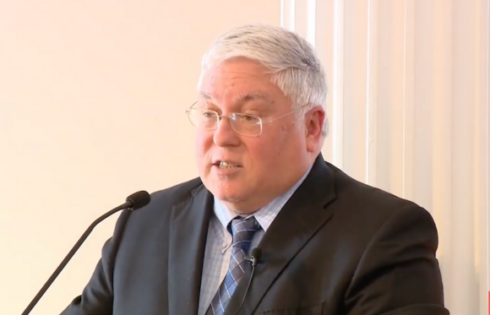
We noted a recent settlement between Georgia’s Valdosta State University and a former student it had expelled for (no joke) making a collage against a proposed parking garage and posting it online.
That followed an appeals court ruling earlier this year that the school president could be personally liable for that wrongful expulsion.
The ruling must have freaked out the administration enough that it decided nearly a million was worth buying off this kid.
And it illustrates the new calculus that schools might want to consider before taking grossly unconstitutional actions against students and faculty, according to Will Creeley, vice president of legal and public advocacy at the Foundation for Individual Rights in Education, which helped start the case way back in 2007.
You see, it’s not Valdosta State President Ronald Zaccari or the public university itself that’s paying the money, Creeley said. From the settlement:
Plaintiff understands that all of the consideration under this Agreement is being paid by the Georgia Department of Administrative Services (“DOAS”) as administrator of the State Tort Liability Trust Fund and the Broad Form Policy and, by Munich Reinsurance America, Inc. providing excess coverage to DOAS and its insureds, who are acting as independent contractors in connection with this settlement and not as an agent of any party released.
That means the state and an insurer are picking up the tab, and that’s very good news for fans of due process in higher education, Creeley says:
Because guess what powerful institutional force carries an incredible amount of influence over university policies and practices? The risk management industry and insurance companies.
As FIRE has long recognized, the risk management industry wields tremendous power within higher education, calling the shots on codes of conduct and best practices. So the fact that civil liberties violations just cost an insurance company and a state tort fund nearly a million dollars will garner plenty of attention from plenty of powerful offices. Public colleges and universities nationwide—and, just as importantly, their insurance companies—now have 900,000 reasons to double-check their policies and make sure that none of their employees have even the slightest inclination to silence and expel a student for speech protected by the First Amendment. That’s what changing the incentives on campus in favor of civil liberties looks like in practice: attaching a cost to violating student rights that is so large that it cannot be ignored.
Though it’s not a First Amendment issue (for the most part), campus sexual-assault investigations going forward could also be impacted by this settlement.
Recall that schools have historically faced greater liability risks from mistreating students who claim they were sexually assaulted, rather than from accused students who claim they were denied due process.
But now that universities have been incentivized by the federal government to quickly judge accused students almost regardless of the evidence in their favor, it seems more likely that a collage-like settlement will emerge when a school’s biased treatment of a student (maybe even a gay male) gets a skeptical look from a judge.
It’s already happened with a state judge’s ruling against the University of California-San Diego for its shoddy treatment of an accused student.
And you can be certain that when the kangaroo-court system for sexual assault – practically mandated by the Department of Education – faces the sustained scrutiny of the legal system, insurers will take note.
Like The College Fix on Facebook / Follow us on Twitter
IMAGE: love work 51/Shutterstock







Please join the conversation about our stories on Facebook, Twitter, Instagram, Reddit, MeWe, Rumble, Gab, Minds and Gettr.